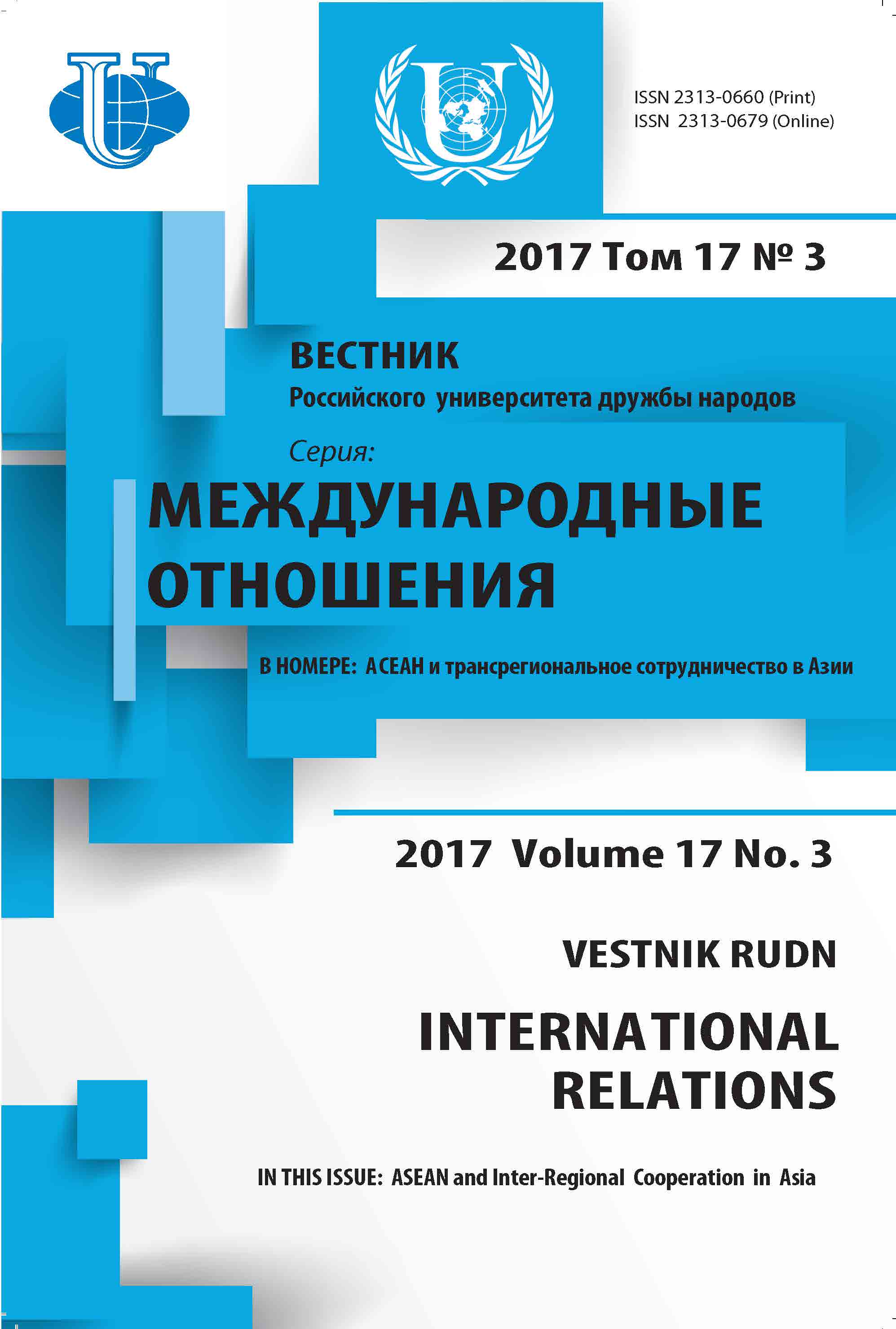STRATEGIC INTERESTS OF INDIA IN SCO: ENERGY AND SECURITY
- Authors: Kharina OA1
-
Affiliations:
- Moscow State Institute of International Relations (University) of the Ministry of Foreign Affairs of Russian Federation, Moscow, Russia
- Issue: Vol 17, No 3 (2017): ASEAN and Inter-Regional Cooperation in Asia
- Pages: 508-517
- Section: THEMATIC DOSSIER
- URL: https://journals.rudn.ru/international-relations/article/view/16763
- DOI: https://doi.org/10.22363/2313-0660-2017-17-3-508-517
- ID: 16763
Cite item
Full Text
Abstract
This article focuses on important objectives and core benefits to India joining the SCO. The relevance of this study lies in the possibility of consideration of true motivations of one country wishing to become a part of the organization. The acceptance of this country as crucial brings into focus the fun-damental question about the nature of the SCO, its aims and objectives. Special attention is paid to economic factors and security issues that guided the state. One of India's major concerns are OBOR and the CPEC that forced it to change tactics of cooperation. The main attention is paid to the concept of the school of political realism. The necessity of use of this theoretical approach in this research is detected and substantiated. Тhe analysis of different factors allows making prediction on the development of relations between India and China and helps to assume what kind of conversion will take place in the organization. One of the propositions, which is key in the work is that India can’t show the policy underpinned by a spirit of rivalry or competition in the SCO even if it is a leading position.
Keywords
About the authors
O A Kharina
Moscow State Institute of International Relations (University) of the Ministry of Foreign Affairs of Russian Federation, Moscow, Russia
Author for correspondence.
Email: olaishra@mail.ru
post-graduate student of Moscow State Institute of International Relations (University) of the Ministry of Foreign Affairs Russian Federation
References
- Asthana, V. (2010). Cross-Border Terrorism in India: Counterterrorism Strategies and Challenges. Washington: Washington University.
- Campbell, I. (2013). India’s Role and Interests in Central Asia. London: Saferworld.
- Faradzhi Rad Abdol Reza & Moradi, G. (2012). Examining the TAPI pipeline and its impact on regional and international rivalries. Central Asia, 2, P. 94-111. (in Russ.).
- Gilpin, R. (1981). War and Change in World Politics. Cambridge: Cambridge University Press.
- Kharina, O.A. (2016). Features of the formation of alliances in South Asia by the example of China and Pakistan relations. Azimuth of Scientific Researches: Economics and Management, 1 (14), P. 96—100. (in Russ.).
- Kharina, O.A. (2016). The neorealist approach to the analysis of conflict relations in the triangle Pakistan — India — China. Belgorod State University Scientific Bulletin. History Political science, 1 (222), P. 178—183. (in Russ.).
- Kucera, J. (2011). India’s Central Asia Soft Power. Tokyo: The Diplomat Press.
- Laruelle, M., Huchet, J., Peyrouse, S. & Balci, B. (Eds.). (2011). China and India in Central Asia: A New “Great Game”? N.Y.: Asian Politics & Policy.
- Lunev, S.I. (2010). Russian-Indian relations: prospects and problems. Moscow: IMEMO RAN.
- Lunev, S.I. (2012). India as one of the new centers of global influence. Comparative politics, 2. P. 90—104.
- McGlinchey, E. (2005). Autocrats, Islamists and the Rise of Radicalism in Central Asia. Current History, 684 (104), P. 336—342.
- Muzalevsky, R. (2011). India fails to gain a military foothold in Tajikistan. Washington: Caucasus Institute, John Hopkins University.
- Sahgal, A. & Anand, V. (2010). Strategic Environment in Central Asia and India. Reconnecting India and Central Asia. Emerging Security and Economic Dimensions, Central Asia-Caucasus In¬stitute & Silk Road Studies Program, P. 34—79.
- Shershnev, L.I. (2007). The Shanghai cooperation organization: the planetary scale. The dialogue of civilizations. The human dimension. Moscow: Fund national and international security.
- Stopdan, P. (2016). India’s Stakes in SCO. New Delhi: The Institute for Defense Studies and Analyses.
- Stopdan, P. (2014). Shanghai Cooperation Organization and India. New Delhi: The Institute for Defense Studies and Analyses.
Supplementary files










